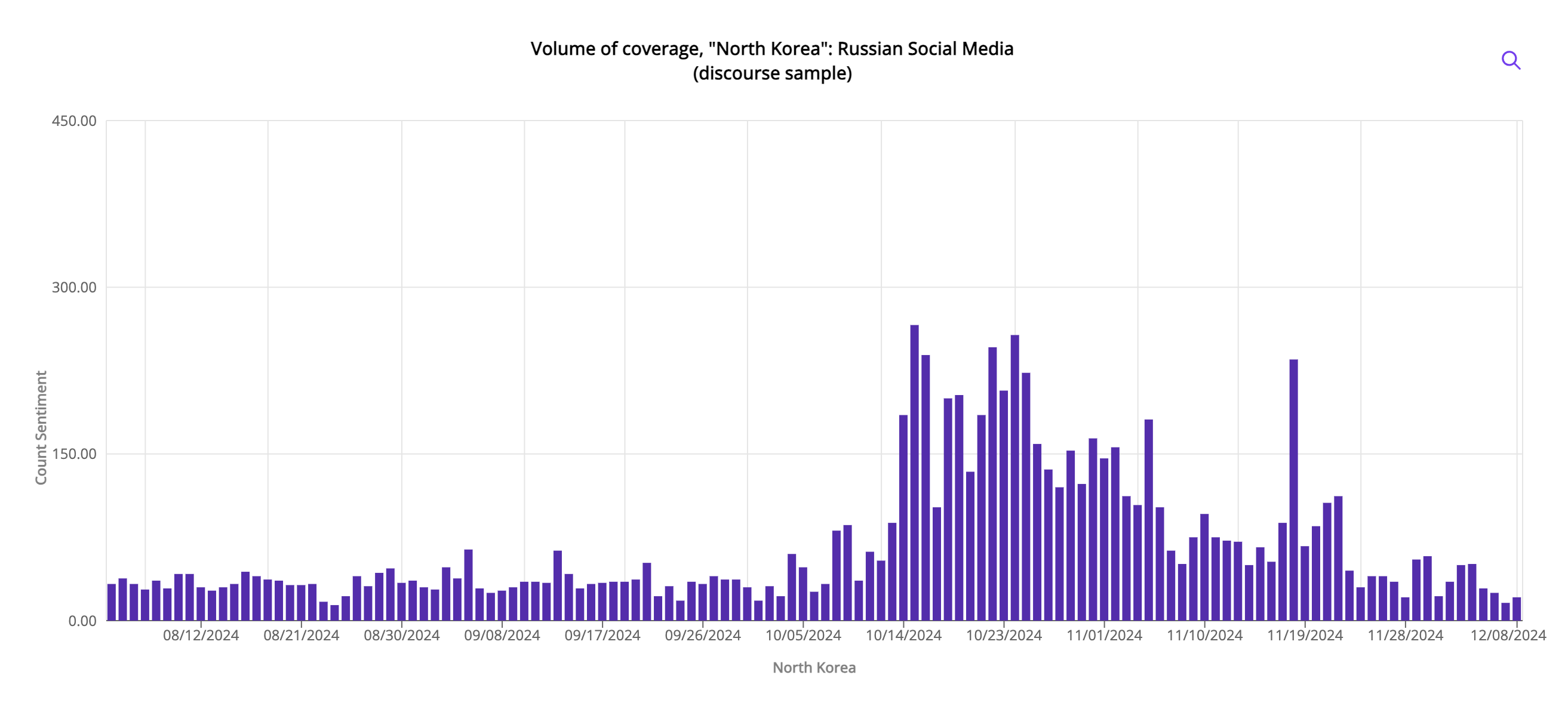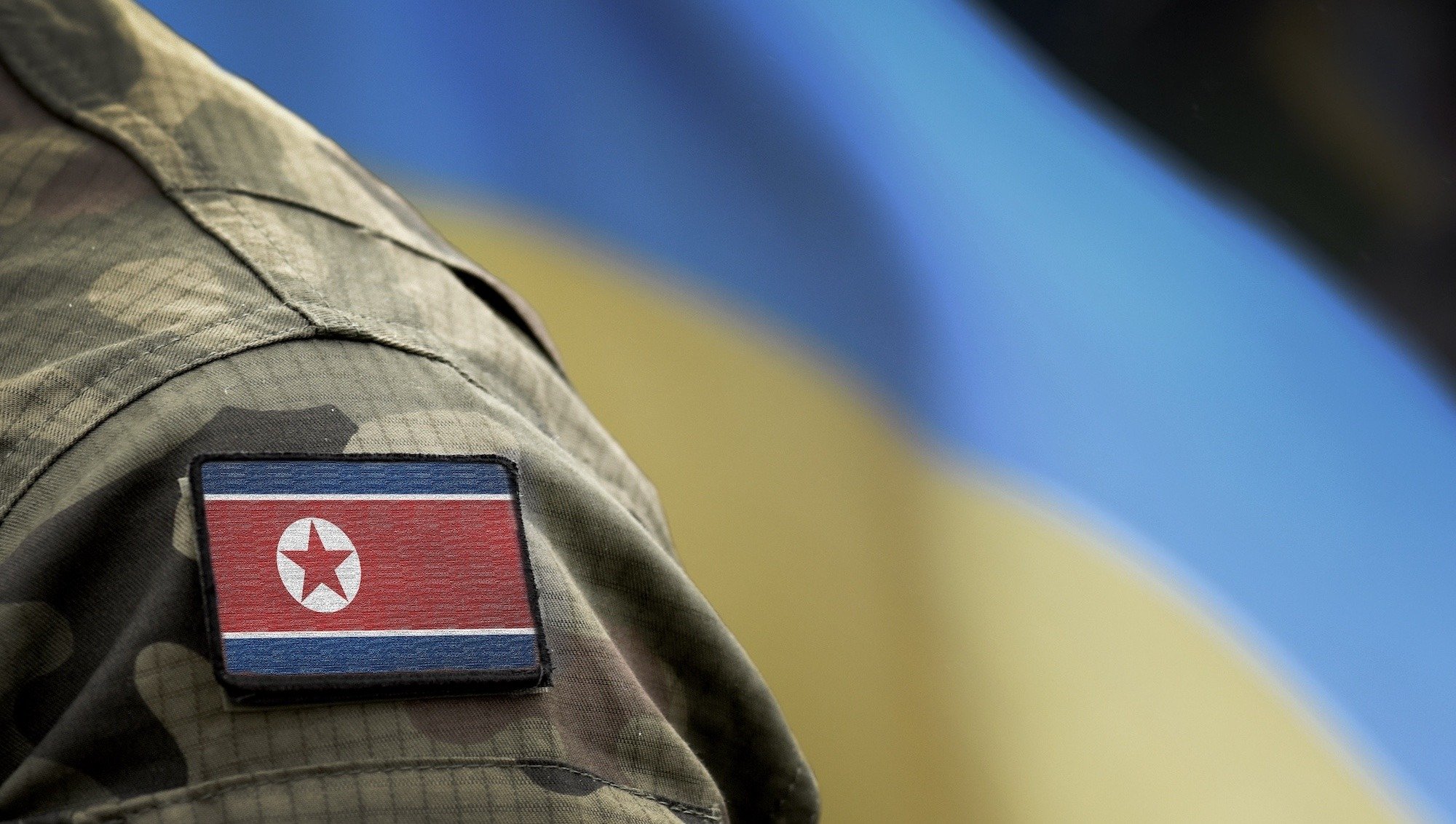Russian Reactions (or Non-Reactions) to North Korean Troops in Ukraine
Key takeaways:
- Russia and North Korea have been cultivating a relationship for decades and have recently pledged mutual military assistance.
- The Kremlin and Russian mainstream media have studiously avoided confirming reports of North Korean troops near the Ukrainian front.
- Russian social media users are divided, some accepting the Kremlin line and others convinced that North Korean troops are present.
- The part of the alliance that is likely to be more consequential is an exchange of technology and weapons.
Russia and North Korea have been cultivating friendly relations for decades.
Recently, their relationship has kicked into a new gear. President Vladimir Putin and Russia’s State Duma have ratified a “strategic partnership agreement” with North Korea, and the United States, South Korea, and Ukraine have all reported the presence of North Korean troops in Russia.
Curiously, the Russian government refuses to confirm or deny these reports. Commenting on the agreement’s clause about providing military assistance if the other partner should be invaded, during remarks at the 2024 BRICS Summit, Putin gave a classic non-denial: “We have never doubted the fact that the North Korean leadership is very serious about their commitments to that, but it is up to us to decide what to do about implementing it.”
What is really going on here, and what are and aren’t Kremlin-aligned media saying about it? What do ordinary Russians make of it? Using our data platform, Talisman, the FilterLabs team set off to find out.
North Korea in Russian News
Coverage of North Korea in Russian mainstream news media was largely positive this summer and early fall. Much of the news related to North Korea was focused on topics like a new passenger train line between the two countries, tourist travel, and a youth sports festival in Russia that North Korea participated in. There were also a lot of articles about Sergei Shoigu (then Minister of Defense) visiting Pyongyang.
In the middle of September, a staunchly pro-Kremlin outlet relayed reports from South Korean intelligence that the North Koreans were sending Russia military engineers and “13 thousand containers of equipment.” The containers, the reports worried, might hold anything from ammunition to rockets and mortars.
In early October more Russian outlets speculated that North Korea might supply Russia with troops.
Then a curious thing happened. In late October, as news organizations around the world began reporting that North Korean troops were in Russia, Russian media outlets began to call the idea of North Korea sending troops a Ukrainian lie. As one headline read: “Zelensky came up with a fake about the DPRK's participation in the SVO in Ukraine in order to get even more financial aid from the West.”
Throughout the rest of October, even as Putin was introducing the aforementioned bill in the Duma to ratify a partnership between Russia and North Korea (with its pledge of mutual military assistance), the Russian mainstream press scoffed at the reports about North Korean troops. “Yes, yes,” wrote one pro-Kremlin site, “American propaganda continues to claim that North Korean troops have already arrived in the Kursk region and will act for Russia literally in a few days.”
North Korea became a much hotter topic in Russian news, largely due to increased coverage related to the war and Russia’s military actions (see volume chart below). There was another significant spike after President Biden authorized Ukraine’s use of US-supplied long-range missiles (in part due to Russia’s use of North Korean troops) on Nov. 17th.
In recent weeks, the Russian news media has generally kept to its story. Some sites report, fairly neutrally, on the fact that other countries claim there are North Korean troops in Ukraine. Others actively ridicule the assertions and take digs at the U.S., South Korea, and especially Zelensky. But across the board, the stories refrain from confirming or acknowledging that the troops are there.
Meanwhile, Radio Free Europe’s project Siberia Realities relayed details of the new Russia–North Korea agreement, which actually revealed a deeper and more important level of cooperation. In line with the early report from the pro-Kremlin source, Siberia Realities’ report found that Russia would supply money, space technology, and 600-700 tons of rice to North Korea in exchange for troops and military hardware.
Meanwhile on Social Media
On FilterLabs’ Russian social media feed—which includes a variety of sources such as social media platforms, online forums, and messaging apps—frank discussions of the North Korean troops were more common.
To be sure, many posts repeated the official line, scoffing at Western reports and mocking Zelensky: “Who is [Zelensky] to confirm this information? Only Russia or North Korea can confirm it, but not him. He just wants to insert his five cents everywhere,” one VK comment declared. Some speculated on Zelensky’s motives for making up the story, or the West’s for picking it up and running with it.
But others assumed that the reports about Pyongyang sending soldiers were true. Many quoted or re-posted Western news articles. On discussion forums and the social media platform VK, some were excited by the arrival of “elite” troops and thanked the North Koreans. Others said the North Korean troops were just there for the money, or joked that “those guys finally got the opportunity to escape.”
Of particular interest were comments accompanying reshares and screenshots of an early October Times article about North Korea supplying Russia with three million weapons a year. Some commenters said they should be supplying more. Others said they would soon be supplying troops, or expressed hope that they would.
Here, too, as in the news, the number of discussions about North Korea has shot up since early October—and again conversations related to the war and the two countries’ military cooperation were a major contributor to the spike.

In Sum
It’s worth wondering why the Kremlin continues to avoid confirming the presence of North Korean troops. Does it see them as a strength? As a possible sign of weakness?
Also noteworthy is the split in reactions on social media, with many users apparently quite willing to mistrust the government’s account. While we saw little evidence of negativity towards North Korean troops themselves or the idea of their being (potentially or actually) at the Ukrainian front—and some discourse exulted at the possibility of the West “fearing” the strength of a Russian–North Korean alliance—people’s willingness to doubt the official Kremlin line on such a subject might reflect a deeper suspicion about whether the war is actually going well.
However, whatever other motives the Kremlin may have, one goal may be for the North Korean troops to provide a bit of a distraction from the real heart of the deal between Putin and Kim Jong-Un. A few thousand troops will likely make little difference. Exchanges of food and technology for ammunition and rockets, however, will make both sides stronger.
It’s a timely reminder that misdirection is one of the propagandist’s most effective tools.
Explore the Data in Talisman
Check out the live data on our data analysis platform, Talisman! You can explore the charts in the interactive dashboard for this newsletter, and subscribers with full platform access can even investigate the individual artifacts underlying the data.
If you don't have a Talisman account, sign up now—a basic subscription is free!
Stay tuned for Syria analysis
The FilterLabs team is closely monitoring reactions to the fall of the Assad regime in different countries. We'll be sharing key findings in forthcoming newsletters. Stay tuned!
%20-%20Tradmark.png)

